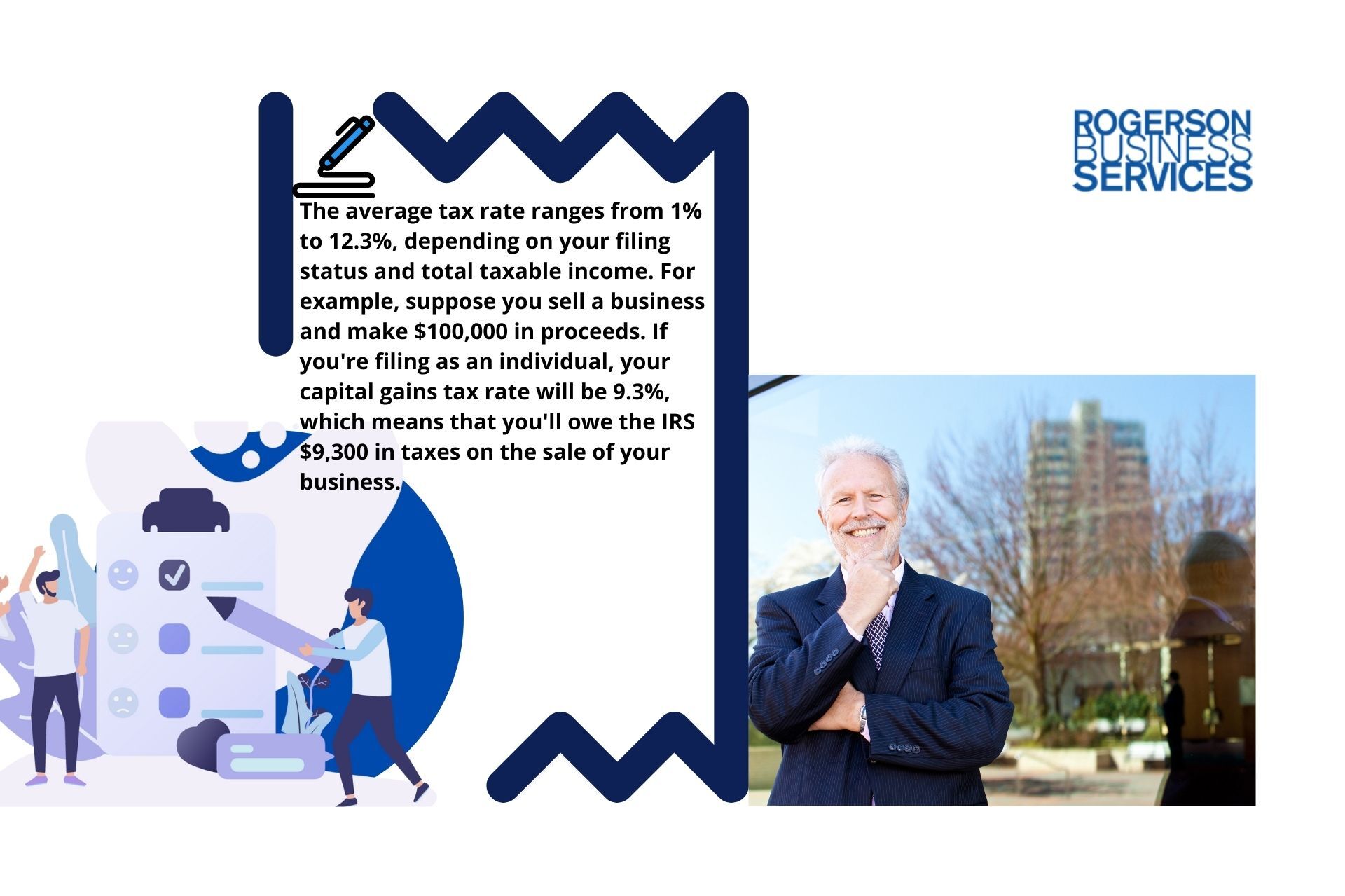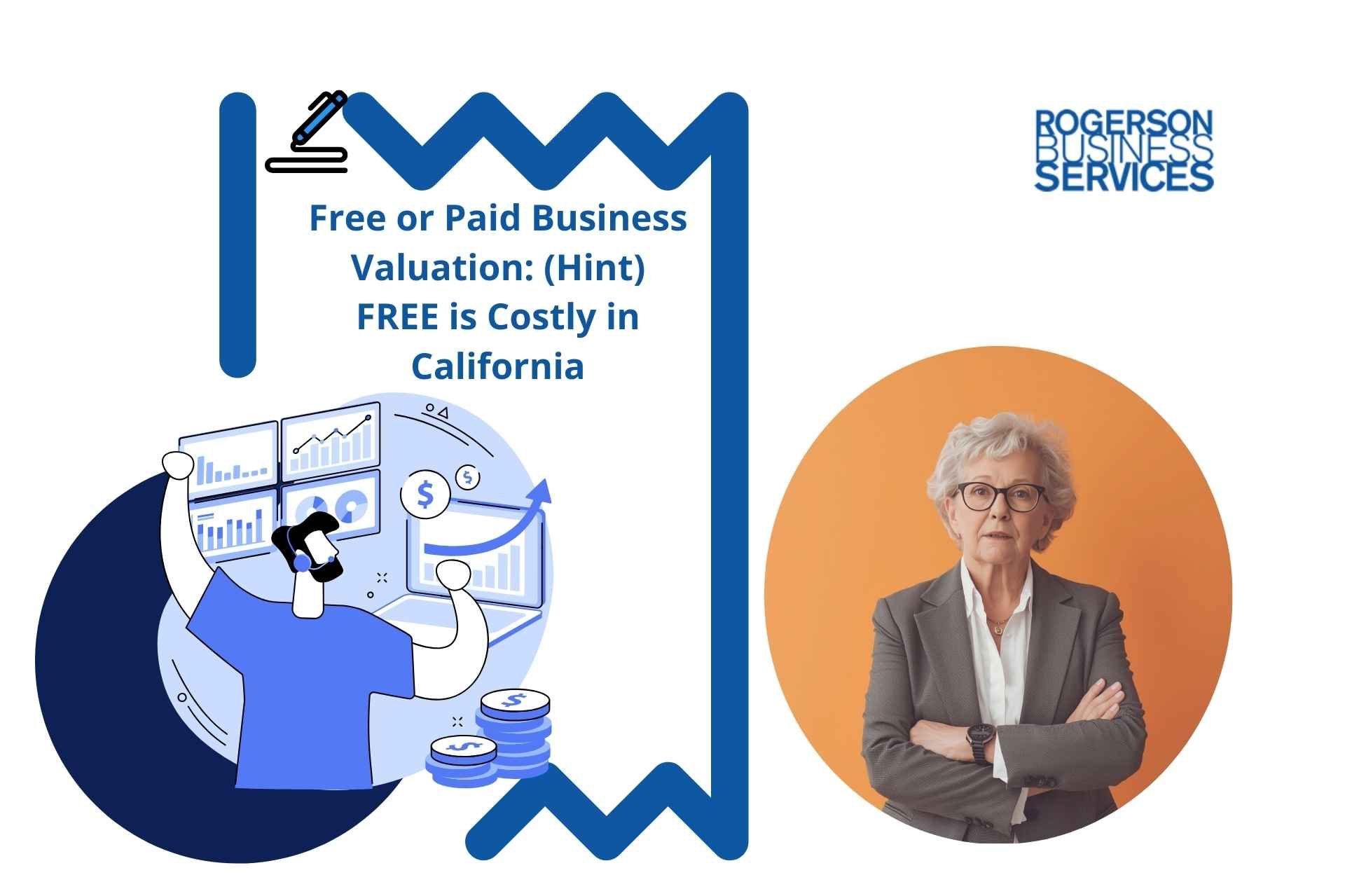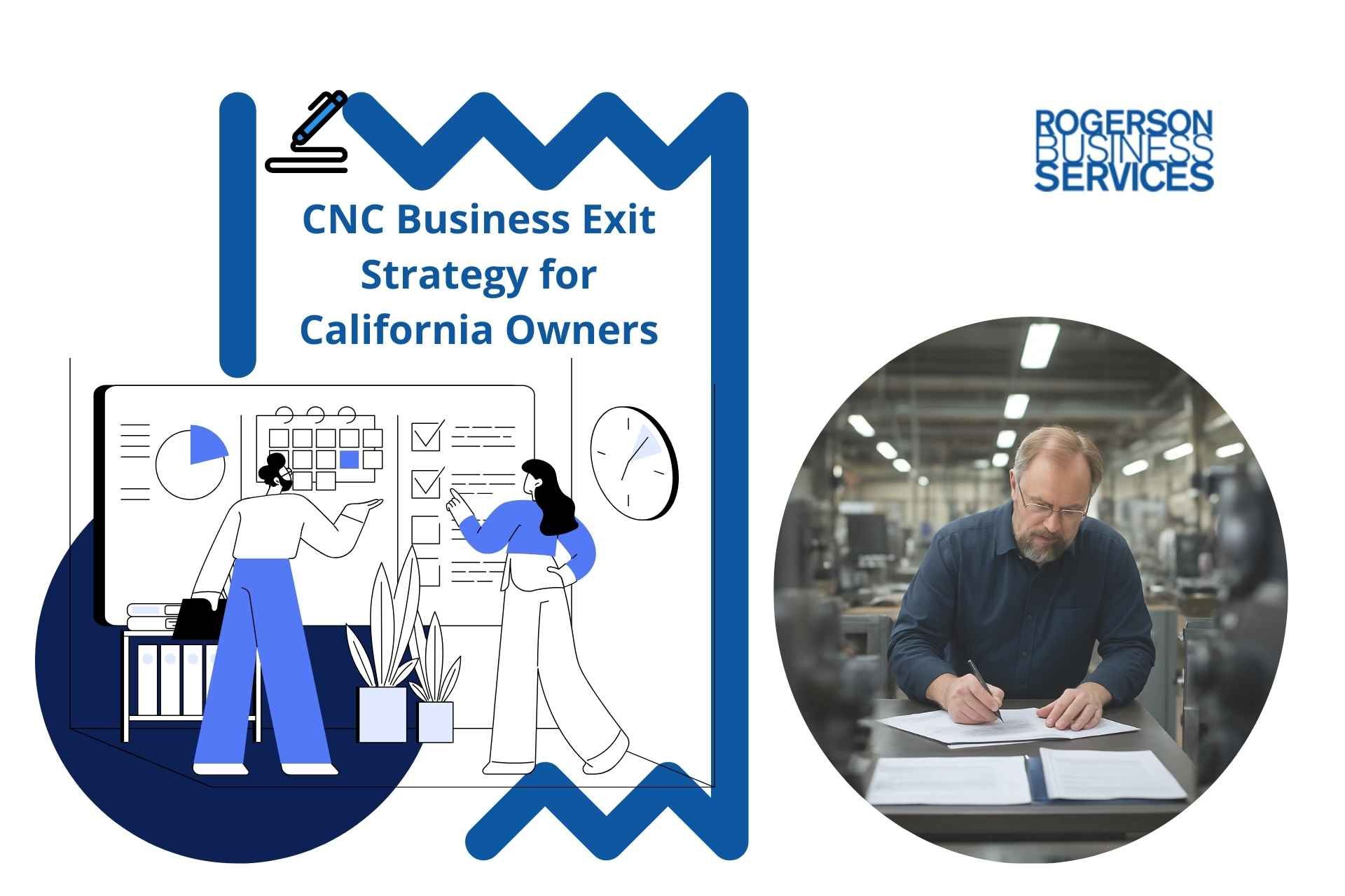How Much Is Capital Gains Tax in California | Selling a Business
CA Capital Gains Tax
A business sale is among the most significant financial transactions a company can make.
Therefore, it's essential to understand the tax implications of selling a business in California before concluding any deal.
In some cases, such as when proceeds are paid out after closing or more than one party is involved, taxes can become complicated and require specialized knowledge.
This guide provides an overview of capital gains tax in California when selling a business, discussing the basis for taxation and the rate at which you may be taxed.
It will also explore other important factors to consider during the process, including working with a lower-middle-market business broker, M&A advisor, or sell-side advisor, and strategies for reducing your capital gains tax liability.
If “how much is capital gains tax in California” is a question that concerns you, read on to find out all the information you need to know.

Here is a breakdown of California's capital gains tax rates:
| Rate | Single | Married Filing Jointly | Head of Household |
|---|---|---|---|
| 1% | $0 - $8,932 | $0 – $17,864 | $0 – $17,864 |
| 2% | $8,933 - $ 21,175 | $17,865 – $42,350 | $17,865 – $42,353 |
| 4% | $21, 176 - $33,421 | $42,351 – $66,842 | $42,354 – $54,597 |
| 6% | $33,422 - $ 46,394 | $66,843 – $92,788 | $54,598 – $67,569 |
| 8% | $46,395 - $58, 634 | $92,789 – $117,268 | $67,570 – $79,812 |
| 9.3% | $58, 635 - $299, 508 | $117,269 – $599,016 | $79,813 – $407,329 |
| 10.3% | $299,509 – $359,407 | $599,017 – $718,814 | $407,330 – $488,796 |
| 11.3% | $359,508 - $599, 012 | $718,815 – $1,198,024 | $488,797 – $814,658 |
| 12.3% | $599,013 and over | $1,198,025+ | $814,659+ |
1. What Is Capital Gains Tax?
Capital gains tax is an income tax levied on selling or exchanging assets such as stocks, bonds, real estate, and businesses. The amount of tax you'll be required to pay will depend on whether the asset was held for more than one year (known as a long-term capital gain) or less than one year (a short-term capital gain).
When selling your business in California, the proceeds are subject to either ordinary income tax or capital gains tax – depending on whether or not you've held ownership for over a year. Generally speaking, long-term capital gains are lowly taxed than ordinary income and short-term ones.
2. How Much Is Capital Gains Tax in California?
The amount of capital gains tax you will be required to pay when selling your business in California will depend on several factors, including whether you're an individual or a corporation and how much money was earned from the sale.
The average tax rate ranges from 1% to 12.3%, depending on your filing status and total taxable income. For example, suppose you sell a business and make $100,000 in proceeds. If you're filing as an individual, your capital gains tax rate will be 9.3%, which means that you'll owe the IRS $9,300 in taxes on the sale of your business.
Note that there is no distinct long-term over short-term capital gains rate in California – the same rate applies regardless of how long you've held ownership. See the tax table above for more information.
3. How To Calculate Capital Gain Taxes in California When Selling a Business
Numerous factors come into play when calculating capital gain taxes, so it's essential to be aware of all the details involved to ensure that you pay the correct amount.
When selling a business in California, the most basic formula is: sale price − cost basis.
To elaborate, the cost basis is the original purchase price of assets plus any additional costs that went into its acquisition, such as legal fees and closing costs. The sale price is whatever you receive in exchange for your business, including cash, stock, or other assets.
For example, if you bought a business for $50,000 with an additional $2,500 in closing costs and sold it for $100,000 two years later, your capital gains will be calculated as follows: ($100,000 - $52,500) x 9.3% = $4308. Therefore, you would owe the IRS a total of $4308 in capital gains tax on the sale of your business.
In the same way, if you sold the same business with a profit of $500,000 and filed your taxes jointly, your capital gains tax would be calculated as follows: ($500,000 - $52,500) x 9.3% = $44,385. In this case, you would owe the IRS a total of $44,385 in capital gain taxes on the sale of your business.
4. Exemptions
When calculating how much capital gains to pay, remember that are certain exemptions. They may help you reduce your capital gains tax liability when selling a business in California.
It's essential to consult with a qualified tax advisor and/or sell-side advisor who can guide you through the process and provide insights into which exemptions are available for your particular situation.
For instance, if you're selling your business as part of an employee stock ownership plan or as part of an exit strategy from a private equity firm, you may be eligible for reduced capital gain taxes.
Additionally, depending on the sale size and other factors, certain types of lower middle-market businesses may also qualify for reduced capital gain taxes.
It's important to note that exemptions and tax rates can vary from sale to sale, so proper tax planning is essential to ensure you pay the correct amount of capital gain taxes when selling your business.
A qualified sell-side or M&A advisor can help advise on the best strategy for your particular situation and develop a comprehensive tax plan before selling your business.
This type of planning can be particularly beneficial for lower-middle market businesses that may not have access to the same resources as larger companies.
5. When Is It Best To Sell a Business for Capital Gain Tax Purposes?
Timing is everything in selling a business. Generally, it's best to sell your business when the market is favorable, and the sale price is likely to be high.
This can help you maximize the return on your investment and minimize the amount of CA capital gains tax you owe.
In California, there are certain times throughout the year when businesses may fetch a higher sale price than average due to seasonal trends or other factors. For instance, if you're selling a construction business, 2nd quarter may be an ideal time to put it up for sale as buyers tend to have more money during this period and are more likely to make purchases.
It may also be beneficial to wait until after tax season has ended to optimize your capital gains tax rate.
This is because the Internal Revenue Service (IRS) typically has more lenient capital gains tax rules around this time of year, allowing you to minimize your overall tax liability when selling your business.
Remember that timing plays an even more prominent role when selling lower-middle-market businesses, as smaller companies tend to be overlooked during peak economic activity.
The reason is buyers may prefer larger companies during these periods, making it more challenging to get a favorable sale price.
Finally, if you're planning to sell your business in California, keep in mind that capital gains tax rates are subject to change annually, and the state may choose to adjust its rates at any time.
Therefore, stay up to date with any changes, as they could impact your bottom line when selling your business.
6. How To Minimize or Avoid Capital Gains Tax on the Sale of a Business in California
A business sale can generate massive profits for the seller if done right. But it can also result in a hefty tax bill if you're not careful.
The good news is there are ways to minimize or avoid paying capital gain taxes on the sale of a business in California.
First, keep accurate records of all financial transactions related to the sale and make sure your financial statements are up to date. This will help ensure you don't get stuck with unexpected taxes when filing your return.
You may also roll over any proceeds from the sale into an alternative form of investment, such as real estate, stocks, bonds, or another business, to reduce your overall capital gains tax liability. This can be particularly beneficial if you're planning to reinvest the money into a similar venture or industry.
Another option is to take advantage of certain exemptions that may be available depending on your situation and the type of business being sold. For instance, if you're selling a company as part of an employee stock ownership plan (ESOP) or through a private equity firm exit strategy, you may qualify for reduced capital gain taxes.
Finally, seek the help of a qualified tax preparer or sell-side advisor when selling your business. These professionals are knowledgeable in capital gains tax and can help you maximize the return on your investment and minimize your overall liability.
Keep in mind that there is no one-size-fits-all answer to minimizing or avoiding capital gains tax on the sale of a business in California. So, evaluate your specific situation and develop a comprehensive tax plan with the help of a professional before putting up your business for sale.
Conclusion
When you start thinking, “It’s time to sell my business and retire” after years of hard work, that is a significant milestone and can be extremely rewarding. However, consider the tax implications before diving in headfirst. By understanding how much is capital gains tax in California, you'll owe when selling your business, you can make smart decisions that will benefit your current and future finances.
The secret is to plan and seek the help of a qualified tax preparer or sell-side advisor who can guide you through the process. Then, with the right team in place, you'll be well on your way to reaping the rewards that come with successful business ownership.
Selling Your Business Now or in 6 Months
If you are a retiring business owner looking to exit your lower middle market business in California, here are five tips to get you started:
1. Don't wait until the last minute to start planning your exit. The process of selling a lower middle market business can take a long time, so it's important to start early.
2. Have a clear idea of what you want to get out of the sale. Know your goals and what you're willing to negotiate.
3. Choose the right type of buyer. Not all buyers are created equal, so do your research and find the right one for your business.
4. Be prepared for a lot of due diligence. M&A buy-side due diligence is when buyers will want to know everything about your business, so be ready to provide documentation and answer questions.
5. Be flexible with the terms and conditions of the deal. It's important to be open to negotiation to get the best possible deal for your business.
Rogerson Business Services, also known as, California's lower middle market business broker is a sell-side M&A advisory firm that has closed hundreds of lower middle-market deals in California. We are dedicated to helping our clients maximize value and achieve their desired outcomes.
We have a deep understanding of the Californian market and an extensive network of buyers, which allows us to get the best possible price for our clients. We also provide comprehensive support throughout the entire process, from initial valuation to post-closing integration.
Our hands-on approach and commitment to our client's success set us apart from other firms in the industry. If you consider selling your lower middle market business, we would be honored to help you navigate the process and realize your goals.
If you have decided to value and then sell your lower middle market business or still not ready, get started here, or call toll-free 1-844-414-9600and leave a voice message with your question and get it answered within 24 hours. The deal team is spearheaded by Andrew Rogerson, Certified M&A Advisor, he will personally review and understand your pain point/s and prioritize your inquiry with Rogerson Business Services, RBS Advisors.
This is part of business owner tips to answer how Rogerson Business Services attract qualified buyers to sell your business series ->
Hey there! Can we send you a gift?
We just wanted to say hi and thanks for stopping by our little corner of the web. :) we'd love to offer you a cup of coffee/tea, but, alas, this is the Internet.
However, we think you'll love our email newsletter about building value and properly position your company before transition/exit your business ownership.
As a special welcome gift for subscribing, you'll also get our helping and educational guides, tips, tutorials, etc.. for free.
It's filled with the best practices for retiring serial business owners like Dan Gilbert, Larry Ellison, Warren Buffett, and many more.
Just sign up for our emails below.


